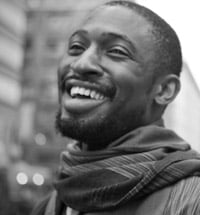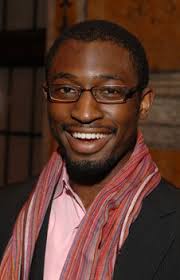
Speaking with Dr. Uzodinma Iweala is like taking a graduate course in public service with a concentration in Africa. Uzo, as he prefers to be addressed, combines his pedigree, his incredible artistic talents, love for Africa and training in medicine towards alleviating the plight of Africans. Uzo loves Africa, and once you start a conversation with him, you will quickly discover why he is the quintessential African. If he is not working on helping eliminate the scourge of HIV/AIDS in Africa, he is setting up a gallery in Abuja to give African artists a space to display their work. In order to ensure that the voices of Africans are heard around the world, Uzo has gone a step further through his work as Chief Executive Officer of the African Center in New York to amplify the voices of Africans and showcase the contribution of African artists. Uzo, whose name means “the good path” is indeed showing African artists the good path to follow.
Uzo possesses all the trappings of royalty, privilege and exceptional education, having attended such ivy league colleges as Harvard and Columbia. However, he is best known as an award-winning writer and filmmaker with an an incredible heart for public service. With three bestselling novels, including the acclaimed Beast of No Nation, since adapted into a movie of the same name and featuring Idris Elba, Uzo has taken his place amongst Africa’s great storytellers. Nigerian Parents Magazine sat down with Uzo to listen to his inspiring story, his dream for Africa and his heart for humanity. We invite you to enjoy Uzo’s story. Please share your reactions and comments on our website or via email to editor@nigerianparents.com. Comments that meet NPM standards will be published. Enjoy.
NPM: Dr. Iweala, we would like to welcome you to Nigerian Parents Magazine.
DR. IWEALA: Thank you for having me.
NPM: Nigerian Parents Magazine is something that we started to try to tell the stories of successful second generation Nigerian-Americans, young men and women, who are really doing a lot of great things. We also are hoping that the work that we do will translate into many more people like you who would want to partner with Nigerian Parents to raise successful Nigerian-American children. That’s our goal. That’s our mission. That said, let’s start with the background questions. We know that in your part of Nigeria, Igboland, they give their children names that reflect exactly the situation when the child is born and things like that. So, tell us what your name Uzodimma means?
DR. IWEALA: My name Uzodimma means “the good path” or “the good road”. Depending, I guess, on if the road is good, then you shall follow, I suppose. There are various ways of looking at it. But I think my parents named me this for many reasons. And I have to say I really love my name because it is for me; it’s an anchor. It’s something to go back to when I am feeling like I need some direction, or that I need to sort of think about things. I often find that if I sit down and I just write out my name, or write out the meaning of my name, it helps me organize my thoughts and say, okay, look, your parents named you this because in their minds or when you were born they were thinking, this is somebody who is supposed to create his own way. This is someone who is supposed to, hopefully, show you one of the ways that you can possibly live your life. And I think, you know, everybody has their own journey and has their own path to follow. But I also do think sometimes we are called upon to maybe blaze new paths or to try to show new roads for people and that’s it. That’s one of the ways that I think about my name and one of the ways that I interpret my name and sort of think about why my parents named me such.
NPM: Thank you. I love the thought that our people put into naming their children. And a lot of times it does go on to shape the children – the way they think, their philosophy in life and all that. So I think you’ve captured that thought well.
You come from a very influential family and everybody knows your parents. Your mom is like, probably the most recognizable Nigerian woman, most influential. So tell us a little bit about your background, your childhood and being raised by the great Ngozi Okonjo-Iweala.
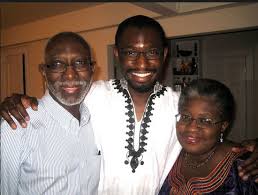
DR. IWEALA: Yeah, it’s funny, I guess to think about it that way, because in my family, my mom is my mom; my dad is my dad. I think when people look at successful people, people often think that they were always that way, you know. Once you reach the pinnacle, you’ve always been at the top. But obviously, you know, when we were growing up, my mom was just my mom and my dad was just my dad. And I think it is important to note that my parents, like everybody else, had their own struggles in coming up. For example, moving from Nigeria to the United States. My mom came for university; my father came later after he was done with his medical studies and training. And trying to set up in a country that you don’t know, that doesn’t have your customs, where you don’t really have a network of people. That’s one. And then, of course, like a lot of our families, having other relatives come and follow you and also then having to be the anchor and the support for all of those other people. So, if you ask me how growing up was, number one, I think, I just remember my parents doing what they needed to do to make it in the US context and learning a different way of operating. And they themselves will tell you all kinds of stories about how they didn’t understand this was supposed to happen in the United States. Or how they had to learn the system about how we were supposed to be schooled and all that sort of stuff. I think everybody goes through that trial and error process.
But they were definitely rocks and pillars of stability for me and my siblings. I have three other siblings. I’m actually the second child. I am the first boy, but I have an older sister. And then I have two younger brothers. When I think of Nigerian parents, I think of the Nigerian values they bring to the picture, those values of hard work, of respect for your elders, of making sure that you respect yourself more than anything else. I think those things were some of the key values that they raised us with and that I’ll be forever grateful to my mom and my dad for.
I think one of the things that you get into when you are the first generation raised here in the United States and your parents are coming again, with those older Nigerian values, is there is obviously going to be some clash and some friction. Growing up a teenager in the United States… growing up as a kid in the United States, there are certain ways of behaving that people are exposed to that sometimes is hard to translate to your parents, right? For example, just an easy example… I am assuming that you guys all have kids. It’s like, when your son or your daughter comes home and says: “I want to go sleep over at so and so’s house”. Next question is: “don’t you have a bed here? What’s wrong with our own house? Why are you always trying to run out?” But they are not understanding that that’s a sign of friendship, that having somebody ask you to come over and spend the night in their house and whatnot, it doesn’t mean you’re running away from your own place; it just means that you’re signifying just how important this other person, this friend, is to you. And that’s how relationships in this context grow. And you know, it might also be just because you’re living in an environment where the ties between people are not the same. You know, in Nigeria, you might have more of your relatives and family and friends around. Whereas here, you build different networks in that way.
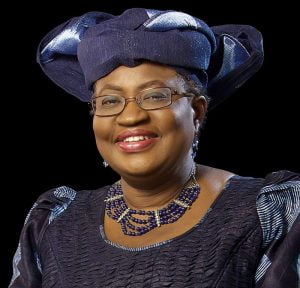
I would also say the other thing is, both of my parents worked extremely hard. So my mom spent the early part of her career at the World Bank. So, to me, one of the reasons I have the career that I have is obviously because of watching her work at that sort of international level on issues of economics and development, and how to make the world a better place mainly for Africans, but also for the less privileged amongst us. Not everybody was born into privilege. In fact, the majority of people are not born into privilege of any sort. From both of my parents, in different ways, I got the understanding that if you do have some privilege, any amount of privilege, it’s incumbent upon you to do something to make sure that you are living morally, living honestly, living well. And then also at the same time, part of that is making sure that you’re doing something to help other people in the world who do not have the opportunities or access to the same things you have.
On the other side, my father, being a neurosurgeon doctor, was probably one of the reasons why I studied medicine. I often joke that for my mom, she would go to the office and come back everyday. I don’t think I would really know what she did every day. Whereas, my dad, on the other hand, is a doctor. So when you go to a hospital or if you went to visit my father at work, if he picked us up from school and he had to go back by the hospital, you can actively see, sort of, how his work really does touch the lives of people literally every single day.
And so I have those two examples. One is on the sort more micro level, which is like person-to-person – this is what I am doing with my life. This is my calling. This is how I help people. That’s my dad. And then with my mom, on the other side, it was: this is how you think about problems in a global sense. How do we help large numbers of people and how do you position yourself to do that? And my mom didn’t become minister of finance the first time until I was in university. And most of us, my siblings and I, were in the university with the exception of my youngest brother. And then the second term he had as Minister of Finance, I was well into adulthood. And which is, I think interesting, because I think a lot of times people have ideas about how those people who are close or in proximity to power are supposed to behave.
And I think one of the things that has been really both interesting, fascinating and helpful to me again, as somebody who’s trying to organize my own life, is watching what people’s perception of my mother is and how people expect her to behave, versus how she actually behaves with people. The fact that she’s somebody who doesn’t try to create this distance between her and people – “oh, I’m a minister” or “I’m somebody who’s up here. And there is the rest of you guys”. No, she’s the person who would fly commercial when doing her trips. She’s the person who makes sure to greet every single person that comes up to her when they come up to speak to her, whether it’s at an airport or at a function, because she says: “Look, these people are the people. This is the reason why I do the work that I do. My Nigerian brothers and sisters, the citizens of Nigeria, whether in Nigeria or around the world, these are the people who have both given me strength and motivated me and who’ve supported me. And at the same time, these are the people to whom I owe my gratitude and my ability to use my talents in the way that I use them”. So I’ve taken that in very much so, both in terms of just the motivation, but also the attitude. Something that she’s also said to me all the time is: “Look, you know, on your way up, you better be kind to everybody on your way up, because you’re gonna meet the same people on your way down. You don’t treat people anyhow, just because you might have some kind of higher status than they do at any point in time, because status can always change. The only thing that doesn’t change is your own moral compass and what’s inside of you”. And both of my parents are very much like that.
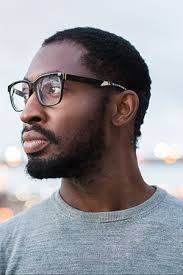
So in thinking about that, these are some of the intangible lessons that I think oftentimes parents don’t realize that they are teaching their children just by the way that they behave in the world. If you tell your child: “oh, don’t shout in a place” but you yourself are always shouting, then your child will likely be shouting. But if you move into a place and you act with a certain amount of dignity and poise, you know, when your child starts running around, and you say, “hey, come here, be quiet”, that child’s going to understand that you better come sit down and shut your mouth kind of situation. And so, as I think about how I would want to be as a parent, when I get ready to have kids, these are the things that really are the most important, more so than say, oh, being Minister of Finance, or having a fancy profession or anything like that. It’s okay, so that’s great. And I aspire to that. I aspire to have a certain amount of recognition and success. But more than that, I aspire to create an environment both for my family and for my friends and for the people that I’m closest to in which I live by, and I am seen to be living by the values which I hold most dear.
NPM: You know, if we were to even stop this interview right now, you have just encapsulated all of the things that we were looking for as far as Nigerian Parents Magazine is concerned. So that’s fantastic. But I do want to ask you one question. Who is the disciplinarian in the house? Who disciplined you most when you got into trouble. Your mom or your dad? Because every child gets into trouble, so don’t tell you didn’t get into trouble.
DR. IWEALA: I definitely got into trouble. Every child has to get into trouble. Absolutely. They were both disciplinarians, but in very different ways. You know, we always joke that my mom tended to be a little bit more like she would be shouting at you more often or scolding you like, “why did you leave your shoes here? Why do you do this? Why’d you do this and that?” And my dad is a very calm, quiet guy. So he is just calm until you do that one thing that really angered him. Really. So, they approached us in different ways. And I think, each one of your children is different. My siblings and I are all very close, but have very different approaches to life, if that makes any sense. So I think each child requires a very different kind of understanding. And there’s probably also a thing with fathers and sons, especially fathers and first sons. For my dad and I, there was a lot of pressure. There’s a lot of scolding, I think. Because it’s like “well, you’re my first son. I have to make sure that you understand what responsibility you have, how you’re supposed to get things right. And I think for that reason, there was some friction between me and my father, just because there has to naturally be. As I got older, I began to understand. Okay, this is why he was saying some of these things, why he was really pushing. For example, we got into a lot of arguments about the fact that he wanted me to really just focus on studying medicine. And I was like: “Well, you know, medicine is great, but I also really want to do this artistic thing.” And so there was a lot of tension between us and it took a while for us to understand ourselves, right? When you’re younger, you’re just like, this guy doesn’t get me. And then you finish college and you realize that having an English degree isn’t going to earn you a salary. And so you understand, okay, maybe the guy had had it right when he was saying all these things about, “look, you need to be able to use your hands to do work”.
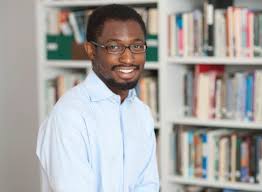
I eventually went to medical school, and found that even as I was building success as a writer, having that medical degree, for example, made it so much easier, just from an earnings perspective, but also just from the perspective of walking into the room and being taken seriously. And that’s when the light bulb goes off in your head and it says: “ah, okay, yep. So this is why they were saying this kind of thing”.
And then what’s really interesting though, is as you get older, and I’m now in my mid thirties, it’s like watching how the relationship with your parents changes. So obviously I think as Nigerians, we will forever be your parents’ child. But at the same time, when they now start coming and saying, “okay, let me ask you for advice on certain things. I’ve seen that you’ve done this with your career”. For example, you know, I’ve written three books. Now, my mom has also written books. But, you know, when she started writing her last book, she came to me and asked for some advice on how to write her book, you know. And I said, “you know, I didn’t understand how much work it was to write a book until I started. So well done”. And that kind of shift, when you start having conversations with your parents in a very different fashion, and there’s an exchange, right?. You’re asking for wisdom, but they’re also asking for your experience. Like I feel very grateful that I have both of my parents and able to have that kind of relationship with them.
NPM: You have touched on a lot of the things that we want to discuss with you tonight, but I am very interested in your values. In watching you speak and listening to you, I am very convinced that you are somebody with the Nigerian values that we all want to inculcate in our children. You have all the privileges that you need, yet you spent time in Nigeria. In fact, I was shocked when I heard that you owned an art gallery in Africa. Can you tell us more about that?
DR. IWEALA: Yeah, also, just to take it back a bit, My sister was born in England. And then my parents came to the US and my brothers and I were born in Washington, DC. So that’s where we really grew up. But we grew up going back almost every summer. You know, my grandparents – both my mom’s parents, and my dad’s parents were in their respective villages. So my dad is from Abia State, from Umuahia, somewhere in that area. And my mom is from Ogwashi-Ukwu as folks would know. So, we would go back, you know, almost every summer or every other summer, and spend significant amounts of time in the village with my grandparents. Shorter time with my mom’s parents and much longer time with my dad. So, I grew up getting to know Nigeria that way. But that’s like you grew up getting to know it in fits and starts. And then you know, there comes a point in time where everyone’s telling you “oh, you’re Nigerian, you’re Nigerian”. But for me, I kept asking myself: “do I really understand what it means to be Nigerian?” It was as if everyone’s telling me this, but I need to understand for myself – what is it that it means to be Nigerian? Number one. And how am I Nigerian? I think those two things are very different, right? Because I think you know, people will tell you you are Nigerian if you like jollof rice. It is like saying this is how you have to be Nigerian. But the truth is that – and this is what I found through my own exploration – after graduating from university, this was 2004, I said, “you know what, I want to go to Nigeria to spend a year”. And I regret the fact that I didn’t do youth service at that time because all the activities I did were essentially youth service activities. But I spent time in Bauchi State working in an internally displaced persons camp. That was after that whole Bauchi/Jos thing. That was back in the day, when people were fighting themselves because of religious issues, cattle, herders, farmers. All that stuff that we see now, has a long history, a long, long history. So I was working there and getting to explore Nigeria on my own, in a way. And then I came back to the US to go to medical school. And after I finished, I said: “okay, now” – I think I was about 29 years old at the time – and I said, if I want to go and understand what it means to be Nigerian, not as a teenager, not as somebody who just graduated from university who’s, not necessarily looking for a job or looking for experience, but somebody who wants to work in this environment, now is the time for me to go, right now”.
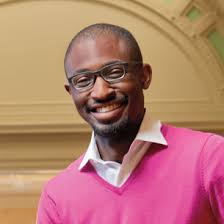
So, after I finished medical school, I went and started working, set up. And that’s when a number of things happened. At first, I was in Abuja, working first for the United Nations. And then the Ministry of Health. So working on health policy related issues, a good job. I know a lot of people like Abuja. Personally, I prefer Lagos just because I think Abuja is kind of dry. And one of the things was there wasn’t much of the arts. I like the arts, that sort of community of artists, arts and artistic people. And there weren’t so many people who were in the Abuja area, at least at that time, who were involved in stuff. So, a friend of mine who is an artist and I used one of the properties that my parents had. And we turned it into an art gallery. And we built this gallery mainly for two reasons. One was we wanted to have a space for artists to be able to show their work. Because there’s such a massive amount of talents. Nigerians are so talented. I mean, you can rattle off the list of multi-talented Nigerians all over the world. But you know, what? Creativity, like in artwork, there’s just such an abundance of talent. We were like, well, we should do something about that. And then to give people a place to spend time. You don’t always want to go out to like a park or to a club or whatever. Sometimes you just want to have someplace where you can contemplate and sit and be surrounded by beautiful things. And that’s why we started the gallery.
A lot of my love for Nigerian visual arts, for the painting and whatnot, comes from my mother and actually my mom’s mom, my grandmother. They’re big enthusiasts and supporters of Nigerian Artists. My mom and dad have a pretty sizable collection of Nigerian artworks. And so I just grew up surrounded by African, and in particular Nigerian, artists, folks like Bruce Onabrakpeya, you know, so many of them all over the place. So, I think, for me, I just was like: “okay, well, this is a natural extension, can we figure out a way to create a space for younger artists to actually have a place to exhibit their work?” And that’s where that came out of.
Now, the other thing that I did while I was in Nigeria over that period – I lived in Abuja for about a year and a half, and then in Lagos for another four and a half years or so was, my uncle had this idea for a magazine. So I worked with him to start Ventures Africa. And the real reason behind that was, again, same thing – where you have so much talent in terms of writing and in terms of storytelling in Nigeria, and you have newspapers, at least some of the time, that don’t seem to be tip top, and that oftentimes don’t seem to compete. And I think the idea, for example, behind Next 234, the Dele Olojede paper, was let’s take the top Nigerian talent and try to create a platform where we can compete with any users around the world. And our magazine in our publication was essentially a similar thing. Mostly focused on business, and then expanding out to other areas. And what I have to say is that if there’s one thing that I was really, really proud of doing in Nigeria, it’s that we took a publication and built it from scratch, hired all local young Nigerians just out of university or had just finished their master’s programs, and started just training people to write. And at the end of the day, it was a real problem, because folks like Bloomberg or CNN would continuously come and poach our writers. And we would also get comments. People thought that we had a huge newsroom of many hundreds of staff, like or lots of journalists. And there were really only at any point in time, maybe 10 people working in the company, but working really hard to tell the stories.
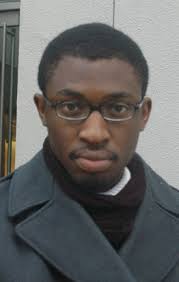
The shame of Nigeria is that we have such talent just all over the place. And the structures to grow that talent aren’t there. So that people are then forced, in many ways, to look outside. Because if you’re sitting in the country, and you want to write but everybody’s telling you: “oh, don’t do that, instead go and become something else, like go be a banker”, when in reality, there is a pathway towards making a name for yourself, through journalism, through writing through your creativity, which we’re seeing more now, that’s one of the things that we wanted to change. And that’s what I spent six years in Nigeria doing. And it was a blast. And you know, on the same side, it was also learning – to go back to this thing of learning what it means to be Nigerian for myself – understanding, okay, so everyone said this is what a Nigerian is. But no. Now I’m in Lagos. I’m in Abuja now. I’m the one who’s flying to the East to go and see my grandparents, going by road. I used to travel. My parents didn’t really like it, but I would drive by road from Abuja to places like Kontangora in Niger state, you know, all these random, random places in Nigeria. But that was essential because, you know, as a young man on my own, it was like, okay, no one can tell me that I haven’t seen Nigeria. No one can tell me that I haven’t tried to understand Nigeria. No one can say that I don’t know my country. At the same time, it allowed me to see “okay, so this is how I am as a Nigerian, and it’s also okay to be American at the same time”. It’s okay to carry those two things together. And to hold them. I don’t have to prove anymore to anybody that I’m Nigerian. I don’t have to prove to anybody that I’m American. I can just be the person that I want to be.
But I think, for everyone, and especially for the younger ones – just to speak to parents about this – I think it can be hard sometimes for parents to let kids take that journey on their own. My dad and I actually used to argue about this. When I was younger, I remember at one point in time telling him – we were actually in the village – he was saying something about how, this is your home, this is your home. And I remember saying to him, this is not my home, you know, like, I didn’t… I didn’t grow up here. This isn’t home. And you know, I remember him feeling so hurt by that, because he wanted so badly for us to understand what this place meant to him. Cut to ten, fifteen years later. Now, I can very easily say this is my home. But that’s because I had to experience it and understand it. I had to know what it meant for it to be home for me. Now that I know this is where my grandparents are buried. I know that, at any point in time, if I want to get on a plane and go to Nigeria, at least when they finally lift this blockade, if I land in Nigeria, I know exactly how to get from Lagos to Owerri. From Owerri to Umuahia. From Umuahia to my house. Whereas before I didn’t know that and so I couldn’t claim it as something that I really owned.
NPM: Do accept our condolences on the passing of your grandparents not too long ago.
DR. IWEALA: Thank you.
NPA: Let’s switch gears a little bit. We’ve talked about your personal life somewhat. So let’s talk about your professional life for a bit. You trained as a medical doctor in all these prestigious universities. You went to Harvard. You went to Columbia. Can you talk a little bit about how you came to become a medical doctor? I know you were influenced by your dad, obviously. But what are you doing with that now? You mentioned there were no regrets because you’re leveraging that in your writing. Talk a little bit about your medical career.
DR. IWEALA: Sure. Well, my medical career has been interesting. It is an interesting medical career because I’ve never actually practiced medicine, like with patients, I went right from medical school, into public health. And so this is almost the way of, like molding… like having both the influence of my mother and my father. On the one hand I understood health as being a way that you can directly help people. On the other hand, I had this desire to really have a much bigger global impact than just the patient-to-patient.
I’ll backtrack just a second and say that for me, medical school was actually very difficult. I don’t think that I’m a natural sort of like science-oriented person, I’m definitely much more on the creative side. And I think medical school and the practice of medicine asks you for a certain kind of discipline in a very particular way that maybe doesn’t come naturally to me. So, I’ll be very honest with you. I struggled through medical school, I struggled a lot. I had to really figure out why I was there and why I was kind of torturing myself to study all these things that I didn’t really think were necessarily relevant. And it wasn’t until afterwards that I got out and found that you could have a path through public health, that it really did begin to make sense to me.
So, again, I moved to Nigeria. I started working for the UN. I ended up working with Dr. Mohammed Ali Pate, who was then the Deputy Minister of Health in Nigeria, who’s now I think… who has a very senior position, heading all of health at the World Bank. He’s a medical doctor, infectious disease specialist, but also had a whole background in health economics and whatnot. And then, there was a whole team of us young Nigerians actually, some of whom were trained in Nigeria, others who came back to Nigeria, with medical degrees, who are not necessarily practicing on patients, but were working in this public health sphere. And so, that really made me understand exactly how I could use my medical degree. So, you know, I used it working in those situations, doing things like setting up the private sector Health Alliance of Nigeria, working on, at macro level health projects, malaria, stuff, HIV AIDS stuff, sort of like access to care stuff. And then, you know, I ended up writing this book called Our Kind of People. We can talk about that later.
So, I do, and I don’t use the health degree, like, in a lot of ways my medical degree. It means people call me doctor, and for some reason, if you walk into a room and people say Dr. Iweala, all of a sudden somebody just has to sit up like this. But on another level, my introduction to the policy space, the global policy or international policy, was through health. And a lot of the professional contacts I have now in my current work, where it’s both about the arts but it’s also about policy, are people that I met when I was very young, just starting off in the health policy space.
I run the Africa center here now in New York City, which is a hybrid institution. Part of it deals with arts and culture. Part of it deals with policy and politics, and part of it deals with business and Economics. And, you know, as you can imagine, at a certain level, these contracts are all very … they’re interchanged, or they’re connected to each other. So, a lot of the folks that I met doing health policy work in Nigeria, in the 2011, 2012 kind of period, are folks that I have now been able to speak to and who have introduced me to other people in different policy realms, that are very important and impactful on the work that I do today. So, it’s all to say that medicine can be very specific. You can be like my older sister. My older sister has an MD, PhD from Harvard in immunology. And she works very much on allergy and immunology. She has her lab at the University. She’s a professor at the University of North Carolina. She has her lab and she also has a clinic where she sees patients. So you can do that where she’s very much like a scientist and a researcher. You can do what my younger brother does. He also went to Harvard Medical School and Harvard Business School. And so, he’s now an orthopedic surgeon. He operates but he’s also constantly thinking of different startup ideas. You know, if there’s a business idea, my brother is there. Let me just put it that way. So you can have medicine in that way. But you can also have a career that’s influenced by medicine, but that doesn’t necessarily have to have you in the clinic or the lab every single day. And that’s the kind of career that I have. But I will say this to people whose parents are pushing them to be doctors. Don’t push anybody to be anything. That’s all I have to say. Let that person, because if you don’t want to do it, there’s nothing worse than being in medical school and not really understanding what’s going on. Take it from somebody who was there and not really having the full motivation to be there. I think everyone should go to undergrad. But for professional degrees, that should be somebody’s choice. They’re adults now. They should be able to say, this is what I want to do.
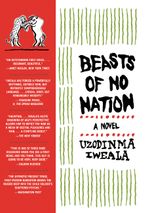
NPM: Dr. Iweala, I just finished reading your book Beasts of No Nation which has done quite well. It is probably one of the best audio books out there.You did a wise thing to get somebody who would read it in the voice that you wrote the book. So it is really a sad story of one of the worst problems we have in Africa, which is child soldiers. But do you feel that other African writers and artists should be addressing the injustice and the problems we have in Africa, rather than promoting Western culture?
DR. IWEALA: Hmm, you are trying to get me into trouble. Well, first of all, I’ll say it’s funny because whenever anybody calls me Dr. Iweala, I always have to say, who? huh? what? I’m so used to thinking of my father as Dr. Iweala. For most people in my professional life, I generally just go by Uzo or Uzodinma. But when it comes to what we’re writing about, I think there are so many stories that need to be told about Africa, about African countries, about individual communities. And there are just so many different ways of looking at how we are and who we are and how we live in the world. And I think each writer or artist, it’s incumbent upon them to find their individual voice and find the story or the issue or the problem or whatever fits them the most. For me, I have always been interested in this idea of how people deal with very difficult situations. And that, in essence, is driven by a number of things. BY family background, I think.
There’s not a Nigerian of a certain age who doesn’t have or hasn’t heard their parents’ or their grandparents’ stories of the Civil War, and what it meant to have to live through that kind of hardship and total disruption. And so I grew up hearing those stories from my parents or my grandparents or my aunts and uncles just about exactly what happened to their lives during that period of time. But at the same time, I also grew up reading about things that were happening in Sierra Leone and Liberia and Congo and places like that. And Beasts of No Nation came out of a desire to try to understand what my parents and that generation of people had experienced, but also trying to understand, like you said, how do we really contemplate this problem of child soldiers in today’s world? At the time it was 2003-2004. Like, how do we really address and tackle this issue?
My mom always jokes with me, she says: “you know, even in your fiction, you’re an issues writer”. So, I think that’s the thing. It’s like there are always particular, maybe larger geopolitical things, or social things that really kind of get under my skin, that I can’t turn away from and that I really need to pay attention to for a period of time before moving on to the next one. Other writers are different. Everybody writes for different reasons. If you write poetry, if you write other kinds of novels, it doesn’t always have to be that you address a very particular issue or a problem. Sometimes, it can just be that you write for the love of the language itself, right? That you write for the love of the words. Sometimes people need to write love stories because love is something that’s so important in all of our lives that we just need to have different ways of explaining it. Far be it from me to tell anybody how they should write or what they should write about.
The main thing is I know what motivates me. I know that we need all kinds of stories, right? And there should be that Nigerian kid who gets up to write a fantasy novel. There should be that Nigerian kid who gets up to write a comic book like Black Panther. There should be that Nigerian kid who gets up to write a romance novel, because those are all part and parcel of who we are as Nigerians, who we are as Igbo people, who we are as Africans. And we can’t forget that. We need that wide spectrum of those stories in order to be recognized as full human beings, to ourselves and also to the wider world.
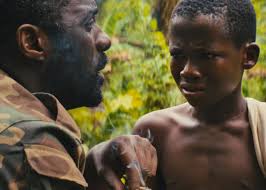
NPM: The book Beast of No Nation is not only engaging; it is touching. But aside from the book itself, I watched the movie based on it, which was really a gruesome movie. I noticed that the main character is a young kid named Agu. He obviously has an Igbo name. How is it then that the movie is shot in Ghana and the dialogue is in a Ghanian language?
DR. IWEALA: Well, This is the magic of moviemaking, right? This is what happens when you make films. On a very technical level, there had been a desire to shoot the film in Nigeria. But at the same time there was, I think, a US State Department travel advisory warning on Nigeria, which meant that the insurance on shooting the film was just way too costly. And Ghana had just a better infrastructure for shooting this particular kind of film at the time and also didn’t have that advisory warning. So, we lost out in that sense. That said, though I have to say that the book was set in an unnamed country. So, I think they did a really good job of trying to keep that sort of feel to it. And, you know, when we were on set, and I was on set for a little bit, just watching these kids. For example, the kid who played Agu, you know, young Ghanaian kid, and all the kids were Ghanaian, some of the older actors, some were Nigerian, some were Ghanaian. And obviously Idris Elba was in the film. This is the beauty and the talent of acting.
Even as you’re changing certain things about the setting, what you are also doing is making sure that the project itself is true to itself. And I have to say I feel very lucky because there was a way of making that movie that would have completely butchered everything. And while it had to be shot in Ghana, I think there was a lot of integrity of the story to the book itself. A lot of care was taken to make sure that these situations, these people – and that was the key thing for me – I wanted to make sure that even as the story was told and some of the characters had to go through some really terrible or gruesome events, that you could still recognize them as people. And my main worry for the film would have been that they wouldn’t have been recognized as a real, feeling, thinking people. But I do think that in the production – and I’m very grateful to the director and the actors, folks like Idris for this – that they really took it upon themselves to make these characters feel like humans, complicated, complex and sympathetic humans. And that’s what really matters to me. But, you know, I keep saying to myself, the next time I’m gonna make sure that I get this film, if they make another film of my books, that we’ll do it in Nigeria.
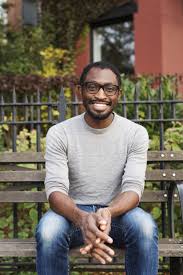
NPM: Let’s move forward to what you’re doing presently. I see that at the center of your mission is transforming the world’s understanding of Africa, it’s diaspora on the role Africans play in the world. It seems to me like a very lofty idea. How are you doing this? And what do you intend to achieve?
DR. IWEALA: So, let me just take it back again. The Africa Center is an institution that essentially comes out of the Museum of African Art. So, the Museum of African Art here in New York City has a 35 year history very much focused on the art of Africa. And about seven years ago, there was this desire to rethink the institution and expand it so that it had, not just arts, but also a broader focus. And that’s the whole college X culture in business. And the reason I think this is a really good mission and how to make it more complete is, as you guys know, and I’m sure it, like your kids and their friends know, there are so many misconceptions about the continent of Africa. So many misconceptions. Even till today. I remember what it was like when I was growing up in Washington, DC. And people would ask me all kinds of stupid questions about, “oh, so do you live in mud huts?” Or, “did you wrestle with lions?” Or whatever nonsense they come up with. People still have those questions now. That’s on one level. On the other hand, there are still all these narratives like, “oh, you know, Africa is a place of disease and sickness”. Corruption, corruption, corruption. Whatever it is that people think about the continent. What we’re saying is like actually, “no”.
In order to correct those misunderstandings, one is, you can keep shouting into the wind all you want, or you can just say, you know what, we’re going to show people what African in essence is, right here and now. Ok? So, we do that in a number of ways. The first is we have this massive 70,000 square foot facility right here in New York, on 5th Avenue where we do programming. And we’re in the process of building up that facility now. That’s really important, because I think it shows Africa has a presence on Museum Mile with all other major institutions, the Metropolitan Museum, the Guggenheim, Neue Galerie, etc. Being able to post up and say, “hey, listen, when you walk into this place you’re walking into one of the finest representations of Africa” is really important. Two is that we’re saying that you can’t hope to understand the continent if you only try to understand it from one angle. If you only try to understand the cultural aspect, you’re only getting a very narrow view. If you only try to understand the political aspect, it’s very narrow. If you only try to look at it from economics, it’s very narrow. What we try to say is that it’s the interaction of these three things. The cultural informs the political, informs the economic, informs the cultural, and that gives a much bigger view and bolder view of what the continent is.
Now, how does that work in actuality? It’s from our programming. So, we run programs out of the space, whether it’s inviting artists. For example, we’ve had Victor Ekpuk, who I’m sure you guys know – Nigerian-American artist, Nigerian artist living here in America. An amazing visual artist. He has done his work, which is about this fusion of African and African-American identities and how those things play with each other. We have had many book readings and talks. So, introducing people to African writers from across the continent, whether it’s folks like Maaza Mengiste from Ethiopia or Namwali Serpell of Zambia. But we just do a variety of programming from all over the continent. We’ve had Lupita Nyong’o read her book for children. Things like that. We had orchestras. I don’t know if you guys know about the Chineke! Orchestra. If you don’t, you should get on them. They operate out of England founded by Chichi Nwanoku. She is Igbo. I think her father was Igbo. Her mother was British. And it brings all these young, talented minority artists in classical musicians together. We had them come and play at the center. We have an amazing restaurant that’s a West African fusion restaurant where anybody can come in and you’re exposed to food from Senegal, Nigeria, Ghana, Ivory Coast. So, when you asked, like concretely, what is it that we too? We provide a space for Africans and Diaspora and also non-Africans to come in and really just immerse themselves in what it means to be from the continent and also to develop a greater understanding of the continent?
Now, you know, we’re an institution that’s growing. You know, it’s an institution that’s had some fits and starts. I came on board in 2018 to help jumpstart things and get it going. Since I started, we went from having no visitors to about 22,000 visitors last year. Until this whole Coronavirus outbreak, we were looking to do about 100,000 visitors this year with the various programs that we were running. So, it’s really a physical, tangible space for people to encounter, what it means to be African and reframe what they think about Africa.
NPM: Just so you know, Kwame Onwachi, who was our first feature, runs an upscale restaurant in DC. High profile celebrities like Obama and members of the House of Reps and Senators go to eat there. And it is Nigerian food. His goat meat and jollof rice are on another level.
DR. IWEALA: Great. Next time I am in DC, I will go there. So you see what I mean? Nigerians are everywhere.

NPM: One of the reasons we wanted to talk to you, aside from the fact that you are obviously a success story and our background and all that, was your heart – the humanitarian angle. You’re doing things that you don’t need to be doing. There is no reason for you to be working on trying to help alleviate HIV and AIDS in Africa and all of that. And you write this book Our Kind of People, which to me really is almost like an X-ray into your heart, in terms of the way you want to serve. Public service runs in your family. Your mom’s been doing that for a while as well. So we just want to take some time to commend you on that. I guess a lot of times what people ask is where can I make money? What is in it for me? Some of the things you’re doing have nothing to do with making money. They have nothing to do with … not even the success. It’s really sacrifice. It is public service. So, that’s really appreciated.
DR. IWEALA: Thank you. Thank you very much.
NPM: More on a personal level, because I look at what you’ve achieved at a very young age. You are still in your early thirties. And what you have achieved is nothing short of amazing. How did you develop the discipline to do the things that you’re doing that’s gotten you to this level at this point, the dedication, the discipline, the work ethic and all of that. How did that come about?
DR IWEALA: To answer that, first of all, I just want to say thank you for the words that you just said that. I mean, really, I very much appreciate hearing that. It makes me feel very warm.
I think in terms of the discipline, it comes from a number of places. One is, I think, again just watching my parents work. And you realize that if you don’t sit down, and as they say, face your work, then no one is going to do it for you, basically. And so I remember, just at an early age, when it came to doing homework. We would do the homework and my parents would make sure that they checked it. Even after that long work. They’d be like, “listen, have you done it?” And they would pay very much attention to the little details. So it’s like you didn’t spell this word correctly. That sort of thing.
I think I learned from an early age the importance of making sure that you’re accurate and you’re thorough in your work. It was something that was very much instilled in me by both of my parents. And then I think the second thing is when you find something that you really love and that you really wanted to do, then in some ways, you have no choice but to be disciplined about it. And I say this, for example, with writing. A lot of times people think that writers and artists are just kind of, you know… like the inspiration hits you. And then all of a sudden you take your pen and you start, and that’s not how it works. Right? The thing is that if you really want to write and you love writing, it’s every single day that you have to sit down and put pen to paper. Every single day. If you’re writing a book, you know you might have a flash of inspiration, and it will come to you. But in order to get that inspiration into something that you can publish, you have to literally sit down and discipline yourself. And I was lucky to have a really amazing mentor, the novelist Jamaica Kincaid, in college, who, when I was in my last year of college, basically instilled that in me and helped me see that you have to sit yourself down in the chair and you just have to do it. She’s like: “the difference between somebody who says they’re a writer and an actual novelist is that … the only difference is that a novelist has finished the book”. That’s really it. And the way the novelist finishes the book is by, even when you don’t feel good about it, you still do the writing.
And so, I have to say it’s funny because, you know, people think that medicine and literature are kind of divorced from each other in some ways, science and the arts. But I would say that having that discipline, you know, as a writer, to be able to get through the bad points, actually really helped me with studying in medical school. And then conversely, you know, when you’re in medicine, you can’t just slack off right? Because that’s somebody’s life, right? So watching some of these doctors who trained me the way that they worked, the way that they were so dedicated to their profession, to the patients, just knowing that somebody is depending on you, whether it’s as an individual or on a larger level where there are a lot of people, also profoundly influenced me. So some of the lessons I got from medical studies. You know, where you are waking up at 4:30 in the morning to go to the operating room. And you’re just watching, and you are there with all these doctors, and you don’t leave until 12 midnight. Well, if nothing will teach you discipline, that will teach you discipline.
While I don’t practice clinically, I think, taking some of that lesson, where it’s like, you even now, for example, today, where we’re all confined to our houses, having to work from home, there is the temptation to go and sit and watch Netflix because I’m a home. I’m just relaxing. But on the flip side, it’s like we have so much to do. We have to build this center. For me, one of the core missions is I don’t want to leave this earth having people talk about the continent in the same way that they did when I grew up, when I was younger. And if I have a chance to change that then I need to be here at my desk doing that work every single day to do what I can.
Obviously, I think one of the things that I have had to try to really learn, is that you also have to have a balance. You can’t just be here all the time. I mean, my parents will constantly get on me that, like, look, it’s not working. Let me put it this way. For a certain period of time, your parents will tell you, leave all that dating, leave all those women and girls and, like, “focus on your work”. And then suddenly, at a certain point in time, it also “shouldn’t you be focusing on going on some dates or something like that? Don’t you have a friend?” So we’ve now flipped into the other side.
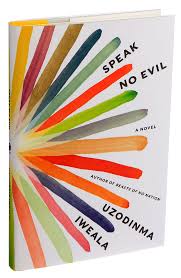
NPM: You are gathering all of these awards left and right, all these mentions – Time Magazine and others. Tell us about some of them. Is there any particular mention or award that you are so proud of?
DR. IWEALA: I’m gonna say this, and it might seem strange. But I think the thing about the awards is… I remember when I first … when Beasts of No Nation first came out, and it started winning all this attention and the awards, I had a chance to speak with the novelist Salman Rushdie, you know, who wrote a lot of books. And it was a surreal conversation because he asked me to sign a copy of my book. Yeah, and I was like … So, I signed it for him. And then he said something to me. He said, “so how is it going?” And I started to respond like, “it’s going so well. Everybody loves it”. And he just took me aside and said, ‘Let me tell you something. You know, if you believe them when they say you’re good, then you also have to believe them when they say you’re bad. So make sure that you keep your head on straight, is kind of what he said to me. And, you know, that’s stuck with me through and through.
Don’t get me wrong. Awards are really nice to get, and it’s really wonderful to have that outside recognition and to have somebody write about you here, say something about you there. But what’s really, I think, more important to me, more than anything else is: one, just internally knowing that I have been able to complete a certain work or that we’ve done well at a certain task and I can step back. I like to build things, whether you’re building a novel or you’re trying to make a film or you’re trying to build a building like we’re building right now – building an art gallery, build a museum, build a cultural center. So to be able to step back and say OK, working with these people, I did that. We did that. That’s where the real satisfaction comes up. Because I can tell you right now, all of the awards that I won, I mean, you won’t see any of them in this room. They are all in the closet. One, because I don’t know in space. But two, because I think it’s not about looking back at what you won. It’s really about how do you continuously improve yourself and use your talents, you know? And so, you know, that’s the main thing.
And the second thing is – the thing that means the most is actually getting direct feedback from people who’ve read my work. So if somebody comes up to me like, you know … I was in Germany once, and I did a reading of Beasts of No Nation. I had an older Nigerian man come up to me and say: “wow, you really captured some of what I experienced during the war”. That’s where you really feel like, OK, I did my work, you know? But look, with awards and whatnot, anytime anybody wants to give me a little money or award, I’ll gladly take it. I just think that while it’s important, you can’t do your work for awards because awards will come and go. And sometimes you might do really, really good work and no one wants to say anything. If you’re only working for the awards, you’re going to be disappointed through and through.
NPM: You know we were talking to Chigozie Obioma not too long ago about his novel The Orchestra of Minorities and he said something that was almost identical to what you’re saying now. The New York Times had described him as “the heir apparent” to Chinua Achebe. And when we brought that up, he immediately dismissed that. It was like, don’t even talk about that. But what I find similar in the way you guys write is that you both have something to say. It is not just about the story. In his case he wrote about Igbo cosmology. We have a lot of young people who are going to be reading this interview and listening to the podcast and aspiring to be as successful as you are. They want to follow in your footsteps and be success stories and one day maybe be on Nigerian Parents Magazine. Could you talk to that generation about some of the challenges, words of encouragement and advice.
DR. IWEALA: I think the first thing I would say to folks, more than anything, is respect yourself. And I start there because I think it’s when you are able to do that, that you begin to develop a clear picture of who you are and what your path may or may not be in any society. That’s the first thing I think. The second thing I would say is, sometimes I think we could be so afraid in our communities, especially in, like Igbo culture and feeling. It needs to be okay to feel right. And that’s not to say that you completely mess up your life or whatever. But like, it’s OK to make mistakes. Number one and it’s okay to try something and not be super successful at it. This is why you have your community, your parents, your brothers, your sisters, the elders – for people to correct you, set you on the right path. But also at the same time to provide support to you when things don’t always go the way that you think. And things won’t always go the way that you think. I mean, for example, I’ll be very honest. I almost failed out of medical school, you know? And if I hadn’t had my parents, my close friends, whatnot, saying “listen, you can do this; it’s OK”, then I don’t know that I would have finished in the end. Do you see what I’m saying?
I think that too many times, there’s a lot of pressure to just do it and to look like you’re doing it right. Doing it right, doing it right all the time. No one gets it right a hundred percent of the time. But you learn. It’s whether or not you learn from the places where you get it wrong. I think that’s really, really important. I’ve been lucky enough to have people who have either set me on the right course when I’ve gotten it wrong, and who provided support for me in time that I most needed it. That’s one of the things that I think is really important.
And the third thing I would say, which I’m just really finding out more now, is really and truly, and I’m not saying that just because it’s Nigerian Parents Magazine; I’m saying it because I actually find it to be very helpful – is like relying on your elders, asking people for advice. I think you know, this goes back to the first thing. Before I was too afraid to even tell my parents that something wasn’t going well because I wanted them to see me as, “oh, he’s doing the right thing. He’s on top of his game”. But now it… sometimes you don’t know the answers, and sometimes may have gone through something that … where they can really give you some guidance and experience. So, you know you’re not feeling good about something, maybe you’re a little depressed. Maybe I can pick up the phone and call my mother, and she’ll say “OK, listen, this is a way that you can think about this and you can handle this problem”. Maybe I can pick up the phone and call my father and say, “ok, look, I’ve run into this issue like, what would you do?” That’s one. And then the second thing is just listen to their stories. And I found that for me, a lot of my writing has come because I was able to sit and listen to my grandparents talk about their stories. You know, I was able to listen to my aunts and uncles, talk about their stories, and man, the stories that people have Wow. I mean, this is again going back … this idea that Nigerians – Igbo people are amazing, right? Because if you think about the things that people had to do, coming from some of the places that, for example, my parents came from, that you guys have come from, that level of discipline, commitment, perseverance, that’s motivation. And I carry that with me. I mean, I’ve had a much, much more privileged, an easier life than either of my parents because of all the work that they’ve done. But, you know, one of the greatest gifts is listening to their own journey and their own struggles and trying to take parts of that and keep that in the back of my mind and also in my heart as I go forward. So there’s no substitute for sitting down and talking to people, and I don’t think we do enough of that. So, I would say, do that and you’ll find that there is so much wisdom to be gained from that.
NPM: Dr. Iweala, it has been so illuminating speaking with you. Is there something else we have not asked you that you would want people to know about you?
DR; IWEALA: The only other thing that I would say you didn’t ask me is about my cat. Who, I don’t know where she is right now. Hold on one second let me introduce you. This is a really born and bred Nigerian street cat. I found her in Lagos. Actually, I shouldn’t say I found her; a friend of mine was visiting, and he found her on the street as a kitten. He wanted to bring her back to the apartment. I said, what kind of nonsense is that? Leave her there. He ended up bringing her back to the apartment. And then I couldn’t put her back out on the street, so I brought her to the US. When I moved back here, I brought her to the US.
NPM: That’s just amazing. Very happy to meet her. So how long did you stay in Nigeria?
DR. IWEALA: I was living in Nigeria for six years, 2012 to 2018 and then I moved back. But, you know, I go back pretty frequently, usually about four times a year. Nigeria is beautiful. There’s a place I would go on the beach in Lagos. I have it actually on my phone here. I mean, I would go there every weekend when I was living in Lagos because it is calm, quiet and peaceful. If only we could just be a little bit more organized. It’s a wonderful place I really like.
NPM: Before we wrap up, just a couple of trivia. First of all, what’s your favorite Nigerian food?
DR. IWEALA: Well, my favorite Nigerian food… man … It depends on the day, but I would have to say that it is pounded yam with egusi soup. When it is really good, it is really really good.
NPM: You can’t go wrong with egusi soup. What do you do to relax?
DR. IWEALA: To relax…. I think this comes from my dad. I like to walk a lot. Either walking or biking, bike riding. Those are the two things. Just like… it helps to get your head out of the daily grind.
NPM: Final question on that, favorite snack? Favorite Nigerian snack.
DR. IWEALA: Oh no. I’ll take it in two ways. My favorite snack is probably like chocolate chip cookies. Okay. My favorite Nigerian snack, as my driver in Nigeria will tell you, is plantain chips. Driver would constantly be stopping to buy plantain chips because I could just eat through cartons of those things.
NPM: Yeah, that is like the chop one chop two deal. You start and you can’t stop. I would like to thank you very much for finding the time. I know you’re very busy, but you found time to sit down with us to do this interview and share your work and your life. It’s just amazing. We appreciate that.
DR. IWEALA: I would like to take a moment to say thank you to you guys because this was really, really fun. And I wish that I had this kind of magazine when I was growing up, for people to see and for parents to read. I think you guys are doing a really wonderful thing. I think it just speaks to the strength of the community that you guys are doing this. Thank you very much.
NPM: The pleasure is all ours, Doc. We will be in touch. Bye for now.


